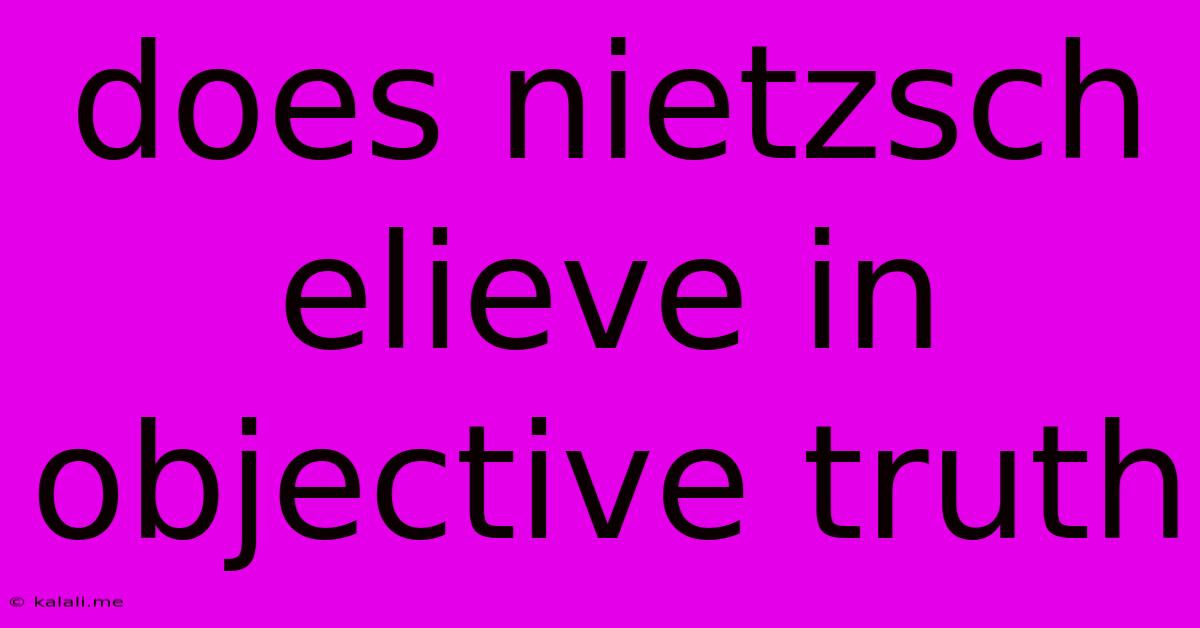Does Nietzsch Elieve In Objective Truth
Kalali
Jun 05, 2025 · 4 min read

Table of Contents
Does Nietzsche Believe in Objective Truth? A Deep Dive into Perspectivism
Meta Description: Explore Nietzsche's complex philosophy and unravel his stance on objective truth. Discover the concept of perspectivism and its implications for morality, knowledge, and the search for meaning. Uncover why Nietzsche's ideas remain highly relevant and debated today.
Friedrich Nietzsche, a towering figure in 19th-century philosophy, is renowned for his radical critique of traditional morality, religion, and metaphysics. One of the most debated aspects of his philosophy is his position on objective truth. The short answer is: no, Nietzsche did not believe in objective truth in the traditional sense. Instead, he championed a perspective he called perspectivism. But understanding Nietzsche's rejection of objective truth requires a nuanced examination of his philosophy.
Perspectivism: Truth as Interpretation
At the heart of Nietzsche's rejection of objective truth lies his concept of perspectivism. This isn't simply relativism, the idea that all perspectives are equally valid. Instead, Nietzsche argues that all knowledge and understanding are inherently perspectival – shaped by our individual experiences, cultural background, and biases. There is no neutral, objective standpoint from which to view the world.
Consider how we perceive even seemingly simple things like color. What we experience as "red" is a subjective interpretation of a certain wavelength of light. This subjective interpretation extends to all aspects of our understanding, including moral values, scientific theories, and even our sense of self.
Nietzsche believed that our interpretations, our "perspectives," are shaped by a complex interplay of factors. These factors include our biology, our psychology, our social environment, and our history. This means that what we consider "truth" is ultimately a product of these influences, making it inherently contingent and subject to change.
The Death of God and the Implications for Truth
Nietzsche's famous proclamation of the "death of God" is inextricably linked to his rejection of objective truth. The traditional understanding of God often provided a foundation for objective moral values and a framework for understanding the world. With the decline of religious belief, Nietzsche saw the collapse of this foundation. This doesn't necessarily mean a literal death, but rather the erosion of the belief in a transcendent source of truth and morality.
The "death of God" created a vacuum, leaving humanity without a pre-ordained sense of meaning or purpose. This, for Nietzsche, was both a crisis and an opportunity. The crisis stemmed from the loss of a stable framework for understanding the world. The opportunity lay in the possibility of creating new values and meanings based on human experience and will to power.
Will to Power and the Creation of Meaning
Nietzsche's concept of the "will to power" is crucial to understanding his perspective on truth. He saw the will to power as the fundamental driving force of life, a striving for growth, mastery, and self-overcoming. This isn't necessarily a pursuit of dominance over others, but rather a striving for self-expression and the creation of meaning.
In this context, truth becomes something to be created, rather than discovered. It is not a pre-existing reality waiting to be unveiled, but rather a product of our interpretations and valuations. This doesn't mean that all perspectives are equally valid, but rather that truth is a dynamic, ever-evolving process shaped by our interpretations and the will to power.
Criticisms and Interpretations of Nietzsche's Perspectivism
Nietzsche's perspectivism has faced considerable criticism. Some accuse it of leading to moral nihilism or extreme relativism. Others argue that his philosophy is self-defeating, as his claims about truth themselves are subject to perspectival interpretation.
However, it's crucial to note that Nietzsche's perspectivism isn't a simple endorsement of chaos or arbitrariness. He believed that the creation of meaning and value is a crucial aspect of the human experience and a vital expression of the will to power. The challenge lies in recognizing the perspectival nature of our knowledge and striving to create meaningful interpretations that are both powerful and life-affirming.
In conclusion, Nietzsche's rejection of objective truth is a complex and multifaceted aspect of his philosophy. His concept of perspectivism provides a powerful critique of traditional epistemology and highlights the role of interpretation in shaping our understanding of the world. While his ideas remain highly debated, they continue to provoke critical thinking about truth, morality, and the human condition.
Latest Posts
Latest Posts
-
How Do You Attach Dishwasher To Granite Countertop
Jun 06, 2025
-
Pizza With Broccoli In Inside Out Congratulations San Francisco
Jun 06, 2025
-
Length To Sister A Deck Joist For A Cantilevered Deck
Jun 06, 2025
-
How To Unclog My Bathtub Drain
Jun 06, 2025
-
Door Handle Only Works On One Side
Jun 06, 2025
Related Post
Thank you for visiting our website which covers about Does Nietzsch Elieve In Objective Truth . We hope the information provided has been useful to you. Feel free to contact us if you have any questions or need further assistance. See you next time and don't miss to bookmark.